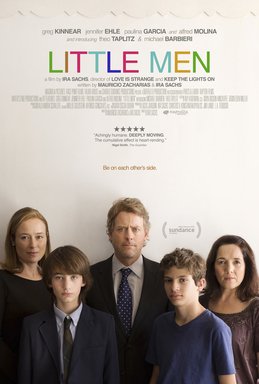Film Review | Little Men Examines Class Conflict in Post-Crisis America
The coin is the root of life’s ills. Money makes the world go round sure, but it’s also that niggling cause of anxious dread that can infect you like a bad flu. Worrisome thoughts about bills, insurance, mortgages, and deadlines can swirl around your head, as you naively try to force them into a corner of your mind. It can destroy lives, strain relationships and bring out a side of you that you wish you didn’t have.

In Ira Sachs’ Little Men, the subtle but devastating power of financial uncertainty haunts a seemingly quaint film. I don’t recall seeing a cent or dollar note throughout the picture, and yet the cloud of economic insecurity feels ever-present, constantly hanging over the key players. We are shown two families, the Jardines and Calvellis, who live in close proximity to each other, yet seem to exist in different worlds. After the death of his father, struggling actor Brian Jardine (Greg Kinnear) moves into an inherited Brooklyn apartment with his psychotherapist wife and 13-year-old son Tony, in a significant downsize from Manhattan. Below their new home lies a fashion boutique rented by immigrant Leonor Calvelli, who lives with her own son Jake a few blocks away. The two young teens eventually start to bond and spend time together.
With the interaction of these two families, Sachs portrays the social friction that is caused by gentrification and the middle class squeeze. Right from the time we first see Brian and Leonor together, we can detect an understated frostiness between then, the kinds of transparent pleasantries that adults love to hide behind. The Brooklyn neighbourhood where Leonor’s dress shop is situated appears to have enjoyed a revitalisation in recent years, resulting in properties like the one she rents becoming exponentially more lucrative. When Brian learns that his own late father had been severely under-charging Leonor for much of that time, he decides that her rent should be tripled, an amount that she cannot possibly hope to pay.
Little Men, it should be stressed, is not a film about the cruel practices of big business and its ability to swallow up the more small-scale stores. As Brian’s wife Kathy (Jennifer Ehle) puts it to Leonor: “I know you think we’re the rich people coming in, but the truth is Brian hasn’t made money in years.” Kathy’s status as the sole bread-winner means that the Jardines find themselves in a similarly precarious situation as Leonor. While there appears to be a noticeable difference in means between the two, neither family is destitute, rather they can both see a financially unstable future that they fear. There are no outright villains here, but there are also no heroes.
Brian, is in essence, a good man and a good dad but his own failure to provide for his family means that he has to rescind his father’s act of kindness: it’s never quite clear whether they truly need the rent increase, or if it’s just so they can feel that bit more secure. Leonor, on the other hand, only becomes increasingly callous as she faces the prospect of giving up her livelihood, as anyone would. She coldly informs a recently bereaved Brian that she was closer to his father then he ever was, even going as far to tell him of his father’s shame over his child’s inability to take care of his family.
[youtube id=”gt27uI1z-i0" align=”center” autoplay=”no” maxwidth=”750"]
Sachs isn’t just concerned with the different realities brought about by economic standing, but also the different realties occupied by adults and their children. As the turmoil between their parents becomes more intractable, the friendship between their kids continuously thrives. With Jake a shy, artsy introvert and Tony a gregarious, confident speaker, the two’s personalities couldn’t contrast more. And yet, they gravitate towards each other the way kids at that age do. They are, for the most part, oblivious to their parents ‘business matters’ and the financial dealings of the adult world. One thing the film gets right is communicating the limited perspective of both sides. The grave whispering, foreign tongues and fiscal vocab makes it seem the parents have their own language to shield Jake and Tony from their reality. Conversely, Brian and Leonor seem unaware that Jake and Tony can sense something is wrong.
The childhood bond is both the film’s emotional core and its most cynical statement. Jake and Tony have relatable interactions and the performances, especially Michael Barbieri’s as Tony, are near perfect. The friendship is unable to fully flourish, and we see how social barriers created in gentrified areas prevent the assimilation of different cultural groups. There are beautifully tenders moments, the best of which comes in achingly real father/son talk between Jake and his Dad near the film’s end. It’s not an emotional powerhouse of a scene, but it’s filled with the little truths that make films like this great.
Ultimately, Little Men can be added to the increasingly impressive canon of post-crisis America films. Unlike recent entries The Big Short or Hell or High Water, there are no angry, fist-shaking sentiments or explicit references to the greedy banks that got us here. Rather, it’s a film concerned with the ordinary lives who of those who suffered through the recession. Sachs gives us good people who are thrown into a bad situation. It’s a small film, yes, but one with big ambitions. And ambitions that it mostly meets.

